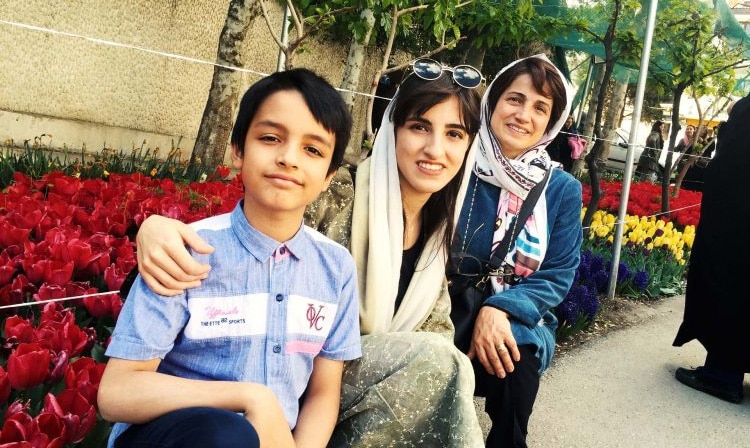Human rights lawyer Nasrin Sotoudeh (R) with her children, Tehran, Iran
Human rights lawyer and political prisoner Nasrin Sotoudeh has been barred from seeing her children.
Sotoudeh, imprisoned from 2010 to 2013 and seized again in June, is suing over the ban on visits by her family to Evin Prison.
The lawyer’s husband Reza Khandan was also detained in October after he posted Facebook updates about her case. The couple have an 18-year-old daughter and 12-year-old son.
Under Iran’s prison procedures, detainees are entitled to weekly visits with family members. But the right has been stripped from many political prisoners, including mothers of small children.
In 2016 human rights activist Narges Mohammadi, who is still in Evin Prison, went on hunger strike to compel authorities to allow phone calls with her children.
The warden of Evin Prison claims that Sotoudeh’s family visits have been halted because “she is required to follow the prison’s internal rules, notably in relation to observing the hijab”.
But sharia law does not require women to cover themselves in the presence of other women, including in Evin’s women-only ward.
Sotoudeh’s lawsuit argues:
It is evident that the order to ban someone from visitation is a form of punishment that is seriously questionable. There are no regulations banning prison visits between mothers and their children because it is essentially inhuman.
Such a ban is not only extremely harmful psychologically, it also seriously undermines the reputation of the country’s judicial system in the eyes of the world.
Sotoudeh has been pursued by the regime over her defense of activists. She was imprisoned in 2010 because of her representation of political prisoners after the mass protests over the disputed 2009 Presidential election.
She provoked the regime’s hostility this year with her defense of women who protested mandatory hijab by removing their headscarves and waving them on the ends of poles, including in Tehran’s main streets.
Sotoudeh was awarded the European Parliament’s Sakharov Prize for Freedom of Thought in 2012, and the Ludovic Trarieux Human Rights Prize in September 2018.


“She was imprisoned in 2010 because of her representation of political prisoners after the mass protests over the disputed 2009 Presidential election.”
That isn’t why she was imprisoned. She was convicted of spreading propaganda (during the course of her legal work) and conspiring to harm state security.
Yes, “spreading propaganda” and “harming national security” are the cover charges used to detain political prisoners, including lawyers.